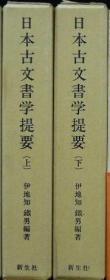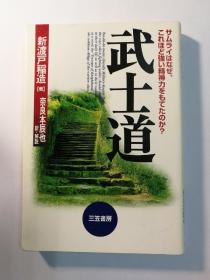
日文原版 武士道 (講談社バイリンガル・ブックス) 新渡戸 稲造 、 須知 徳平
¥ 50 七五品
仅1件
山东济南
认证卖家担保交易快速发货售后保障
作者新渡戸稲造 、 須知徳平
出版社不详
年代不详
装帧平装
货号本棚5
上书时间2020-04-07
- 在售商品 暂无
- 平均发货时间 20小时
- 好评率 暂无
- 店主推荐
- 最新上架
商品详情
- 品相描述:七五品
- 商品描述
-
商品の説明
著者からのコメント
FOREWORD [opening pages]
A little over one hundred years ago, Nitobe Inazo (1862-1933), then a thirty-six-year-old scholar visiting the United States, wrote the following in a letter to William Griffis, author of many books on Japan:
"... I have begun a paper on Bushido -- Precepts of Knighthood -- as an essential of Japanese character, in fact, as a key to understand the moral sentiment of her people."
This is the first reference we have of Nitobe's plan to write this book, which appeared in American bookstores early in 1900. A few years later, riding upon the wave of interest generated by the Russo-Japanese War, an enlarged edition of the book became a best-seller and launched Nitobe into the role of publicist for Japan. While serving as a cultural mediator for over three decades, Nitobe also distinguished himself in other diverse fields as an educator, author, and public servant.
Born into a high-ranking samurai family of the Nambu domain in Morioka prefecture, Nitobe entered the Sapporo Agricultural School in 1877, where he came under the influence of Christianity. He formally joined the Society of Friends (Quakers) while studying at Johns Hopkins University in the United States (1884-87), and remained throughout his life a devout member. Nitobe pursued his advanced studies at several universities in Germany (1887-90), where he received his doctorate in agricultural economics; and, before returning to Japan, he married an American Quaker, Mary Elkinton, which strengthened his personal ties to the U.S.
The question that concerns us most is, however -- Did Bushido justify the promiscuous use of the weapon? The answer is unequivocally, no! As it laid great stress on its proper use, so did it denounce and abhor its misuse. A dastard or a braggart was he who brandished his weapon on undeserved occasions. A self-possessed man knows the right time to use it, and such times come but rarely. Let us listen to the late Count Katsu, who passed through one of the most turbulent times of our history, when assassinations, suicides, and other sanguinary practices were the order of the day. Endowed as he once was with almost dictatorial powers, chosen repeatedly as an object of assassination, he never tarnished his sword with blood. In relating some of his reminiscences to a friend he says, in a quaint, plebeian way peculiar to him: "I have a great dislike for killing people and so I haven't killed one single man. I have released those whose heads should have been chopped off. A friend said to me one day, 'You don't kill enough. Don't you eat pepper and egg-plants?' Well, some people are no better! But you see that fellow was slain himself My escape may be due to my dislike of killing. I had the hilt of my sword so tightly fastened to the scabbard that it was hard to draw the blade. I made up my mind that though they cut me, I would not cut. Yes, yes! some people are truly like fleas and mosquitoes and they bite -- but what does their biting amount to? It itches a little, that's all; it won't endanger life." These are the words of one whose Bushido training was tried in the fiery furnace of adversity and triumph. The popular apothegm -- "To be beaten is to conquer," meaning true conquest consists in not opposing a riotous foe; and "The best won victory is that obtained without shedding of blood," and others of similar import -- will show that after all the ultimate ideal of knighthood was peace.
It was a great pity that this high ideal was left exclusively to priests and moralists to preach, while the samurai went on practising and extolling martial traits. In this they went so far as to tinge the ideals of womanhood with Amazonian character. Here we may profitably devote a few paragraphs to the subject of the training and position of woman.
続きを読む
登録情報
ペーパーバック: 301ページ
出版社: 講談社インターナショナル (1998/6/10)
言語: 英語, 日本語
ISBN-10: 4770024029
ISBN-13: 978-4770024022
梱包サイズ: 18.6 x 11.6 x 2.2 cm
相关推荐
— 没有更多了 —





























以下为对购买帮助不大的评价